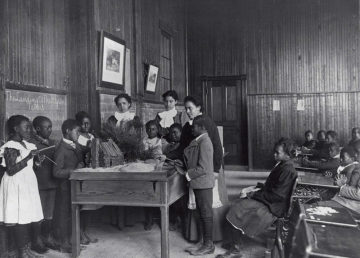Lydialyle Gibson in Harvard Magazine:
 JARVIS GIVENS remembers feeling like a door had opened in his mind. Having flown across the country on the kind of offbeat, open-ended quest that later would become a regular part of his research process, he was sitting in a church storage closet in Prince George’s County, Maryland, sorting through a stack of old documents and videos. This was the spring of 2016; he was just a few weeks away from receiving his doctorate in African diaspora studies from the University of California, Berkeley. His dissertation, on the history of black education during the era of Jim Crow, was basically done. “I’d already put closure on it,” he says. “I was just waiting for approval to file it.”
JARVIS GIVENS remembers feeling like a door had opened in his mind. Having flown across the country on the kind of offbeat, open-ended quest that later would become a regular part of his research process, he was sitting in a church storage closet in Prince George’s County, Maryland, sorting through a stack of old documents and videos. This was the spring of 2016; he was just a few weeks away from receiving his doctorate in African diaspora studies from the University of California, Berkeley. His dissertation, on the history of black education during the era of Jim Crow, was basically done. “I’d already put closure on it,” he says. “I was just waiting for approval to file it.”
But then he received an invitation he couldn’t pass up, from a woman who belonged to an organization founded a century earlier by the historian and educator Carter G. Woodson, Ph.D. 1912. Often called the “father of black history,” Woodson and his organization—the Association for the Study of African American Life and History—were central to Givens’s dissertation. The woman, Barbara Spencer Dunn, had heard about the young scholar’s research and wanted to help. She wasn’t an academic, but for years she’d been collecting materials related to Woodson and the black teachers and students he interacted with all over the country. Maybe something in there would interest Givens?
More here. (Note: At least one post throughout the month of February will be devoted to Black History Month. The theme for 2022 is Black Health and Wellness)
